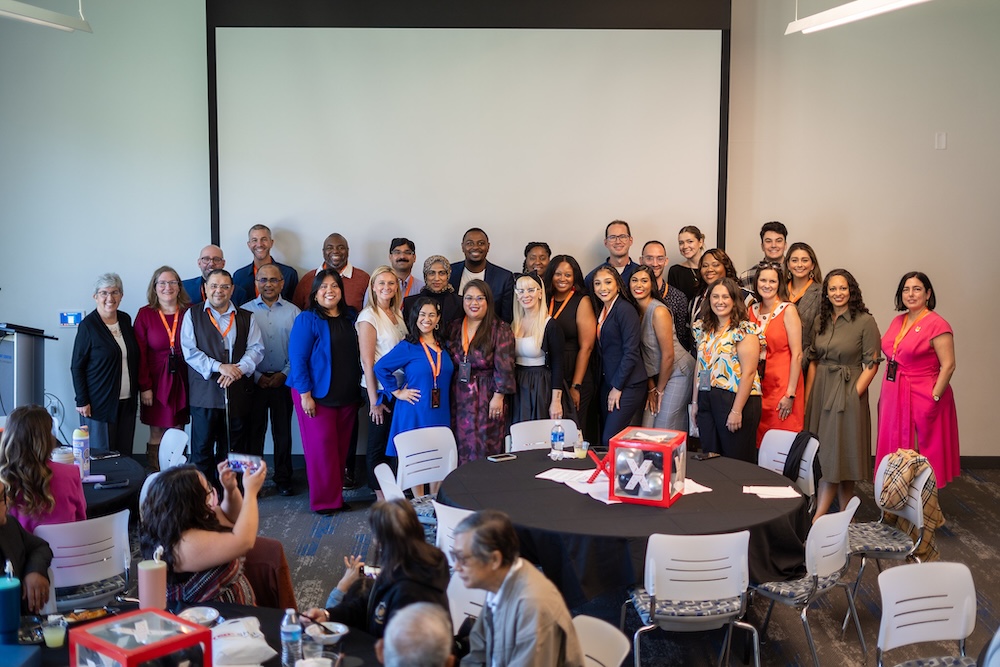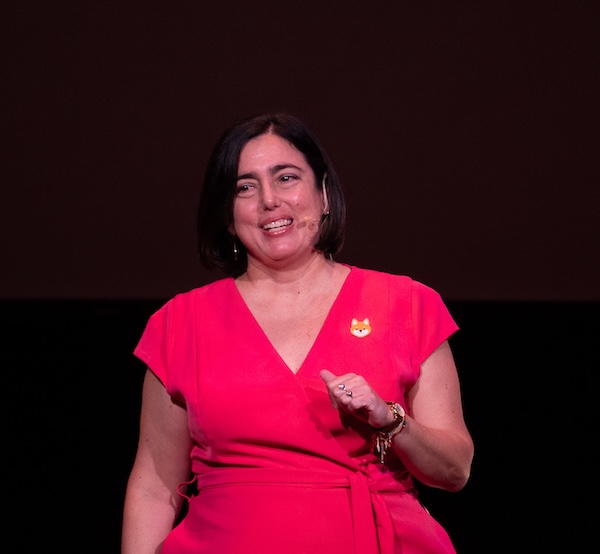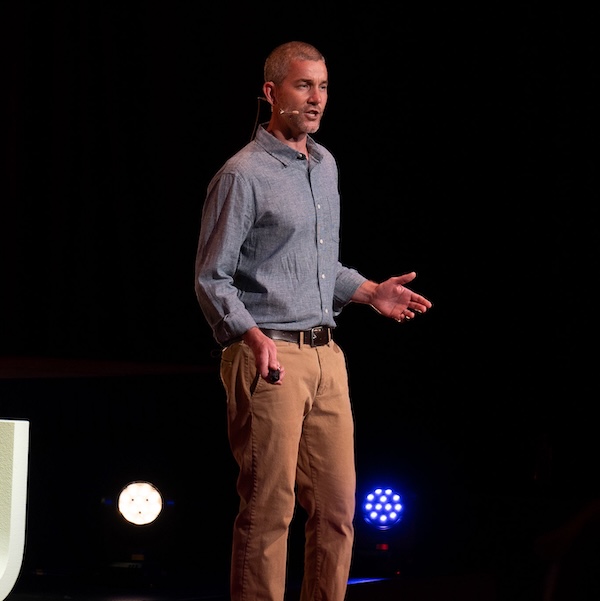Today@Sam Article
Two TEDxSHSU Talks Selected as TED Editor's Picks
Aug. 5, 2025
SHSU Media Contact: Campbell Atkins

Two talks from the third annual TEDxSHSU event in October have been named Editor’s Picks by the official TED organization. The rare distinction highlights Sam Houston State University’s commitment to fostering forward-thinking experiences that transcend traditional educational settings.
The talks, delivered by faculty members Maria Botero and Benjamin Mitchell-Yellin, were selected for their intellectual depth and cultural relevance. The inclusion on TED’s massive platform will expose their messages to more than 40 million YouTube subscribers.
“Being selected as a TED Editor’s Pick is a tremendous honor,” said Renée Gravois, lead organizer for TEDxSHSU and associate professor of marketing in the College of Business Administration. “It signifies that your talk stands out among thousands for its originality, insight and potential to inspire a global audience.”
The inaugural TEDxSHSU was held in 2022. A total of 39 faculty, staff, students, alumni and community members have been featured in the first three events. Each speaker is selected through a competitive application process and is assigned a personal coach to assist them with every step of preparation. Small groups of speakers, coaches and leadership team members collaborate in a series of talk development sessions to support speakers throughout the process.
The fourth annual TEDxSHSU event will be held October 1, 2025, in the Lowman Student Center. The event is hosted by the Elliott T. Bowers Honors College.
Maria Botero: Can Dogs Agree to Participate in Research?
Botero’s talk harnessed a lifelong dedication to understanding animals and how related insights can enhance ethical practices in research. She recently developed the Smart Dog Cognition Lab to investigate whether dogs can provide dissent when participating in a research study. Her previous work observing chimpanzees at Gombe National Park in Tanzania shaped the way she views communication between humans and animals as well as the methods used to study social cognition.

“TEDxSHSU was an opportunity to plant a seed and ask people to think about the ways we can support groups who cannot speak for themselves,” said Botero, a professor of philosophy. “If we bring awareness to one another, I believe communication and dialogue will work at a much higher level.”
Botero’s process meant finding a way to communicate complex topics into a digestible, 13-minute talk. She broke down her vast research through personal experiences that resonated with audience members, including her earliest encounters with a family pet.
“Once you figure out the most important message, it becomes a matter of how you want to deliver it to the audience and walk them through your idea,” she said.
Her assigned coach was Adannaa Alexander, clinical assistant professor and interim assistant chair in SHSU’s Department of Population Health. The most difficult aspect of preparation was memorizing the final product.
“I was posting index cards all over my house,” Botero said. “I would record myself and listen to it in the car to help myself memorize it.”
One of her most valuable takeaways from the experience was the opportunity to work with students. This included those who were chosen to present at TEDxSHSU as well as others who presented to their classmates during the honors seminar on TED Talks.
“This event is a testimony to the quality of students we have here,” she said. “The experience itself is fantastic, but very difficult. If it was hard for me, I can only imagine what it’s like for undergraduate students. All of them did an amazing job.”
Botero was personally honored to learn about her talk’s selection as a TED Editor’s Pick and the opportunity to amplify a message she works tirelessly to cultivate.
“I believe that everyone should try to make the world a little better,” she said. “That has been a guiding star for me in my work. If more researchers begin to consider this, I will have accomplished my goal.”
Benjamin Mitchell-Yellin: What if AI is Making Your Life Worse?
Mitchell-Yellin’s talk considered the question of whether using artificial intelligence will make our lives better. The associate professor of philosophy serves as director of SHSU’s Teaching and Learning Center and has authored numerous publications on a variety of topics, especially topics in ethics. He also focuses on teaching in the age of generative AI.

“I have been following the national conversation ever since ChatGPT was released, particularly in writing instruction,” he said. “I am also involved in several AI-related committees on campus, so I had been thinking a lot about the ethics involved. I was excited when chosen to give a talk on this topic, because it helped me develop some of my thoughts.”
Through his talk, Mitchell-Yellin sought to prompt reflection about the role we assign to technology in our lives. He offered historical context and challenged the audience to consider questions about meaning in life and what we value. He also asked people to question platitudes, such as that quantity is more important than quality.
“It took a lot of work,” he said. “I am used to writing something and receiving feedback, but not memorizing a 14-minute talk to deliver in front of an audience while being filmed. This was a new experience for me, but I was prepared very well.”
Like Botero, he praises the TEDxSHSU organizers for their support throughout the process. This included his personal coach, Adeseye Omole of Houston, a communications industry veteran and founder of Coble Studios.
“This sort of event elevates the intellectual opportunities at the university, which is what we strive for,” Mitchell-Yellin said. “This is a place that provides a forum to share your thoughts.”
He also highlighted the structure of the event, which allowed an opportunity for audience members to have a short discussion with one another following each talk.
“It turns into more of an active environment and a way to work through those reactions in real time,” he said. “It models to the students the sort of participation we want to see in class and life in general.”
Mitchell-Yellin was humbled by his selection as a TEDx Editor’s Pick.
“I was happy just to be chosen to deliver a talk,” he said. “It’s amazing that the TED organization thinks that what I had to say was worth sharing with their subscribers.”
About TEDx, x = independently organized event
In the spirit of ideas worth spreading, TEDx is a program of local, self-organized events that bring people together to share a TED-like experience. At a TEDx event, TED Talks video and live speakers combine to spark deep discussion and connection. These local, self-organized events are branded TEDx, where x = independently organized TED event. The TED Conference provides general guidance for the TEDx program, but individual TEDx events are self-organized. (Subject to certain rules and regulations.)
About TED
TED is a nonprofit, nonpartisan organization dedicated to discovering, debating and spreading ideas that spark conversation, deepen understanding and drive meaningful change. Our organization is devoted to curiosity, reason, wonder and the pursuit of knowledge — without an agenda. We welcome people from every discipline and culture who seek a deeper understanding of the world and connection with others, and we invite everyone to engage with ideas and activate them in your community.
TED began in 1984 as a conference where Technology, Entertainment and Design converged, but today it spans a multitude of worldwide communities and initiatives exploring everything from science and business to education, arts and global issues. In addition to the TED Talks curated from our annual conferences and published on TED.com, we produce original podcasts, short video series, animated educational lessons (TED-Ed) and TV programs that are translated into more than 100 languages and distributed via partnerships around the world. Each year, thousands of independently run TEDx events bring people together to share ideas and bridge divides in communities on every continent. Through the Audacious Project, TED has helped catalyze more than $3 billion in funding for projects that seek to make the world more beautiful, sustainable and just. In 2020, TED launched Countdown, an initiative to accelerate solutions to the climate crisis and mobilize a movement for a net-zero future, and in 2023 TED launched TED Democracy to spark a new kind of conversation focused on realistic pathways towards a more vibrant and equitable future. View a full list of TED’s many programs and initiatives.
Follow TED on Facebook, Instagram, LinkedIn, TikTok and X.
- END -
This page maintained by SHSU's Communications Office:
Director of Content Communications: Emily Binetti
Asst. Director Content & Social Media: Emilee White
Communications Manager: Mikah Boyd
Telephone: 936.294.1837
Communications Specialist: Campbell Atkins
Telephone: 936.294.2638
